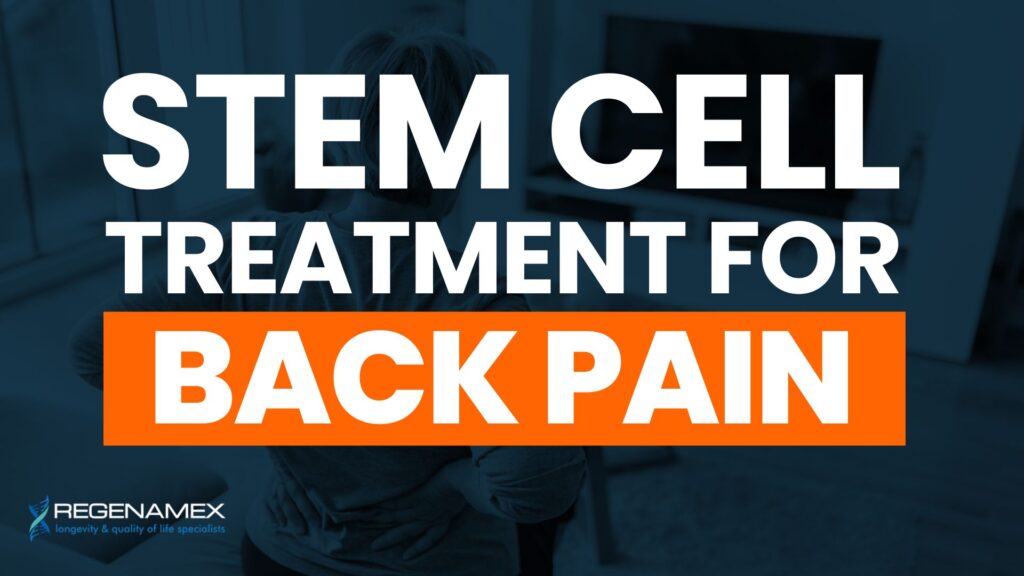
Understanding the Science Behind Stem Cell Treatment for Back Pain?
Stem cell treatment for back pain involves the administration of mesenchymal stem cells into areas of the spine affected by degeneration, inflammation, or injury. These cells, known for their ability to differentiate and regenerate damaged tissues, are introduced either through intravenous infusion or local injection into specific spinal structures such as the intervertebral discs, facet joints.
Once inside the body, MSCs begin releasing bioactive molecules that promote tissue repair, stimulate the formation of new blood vessels, and reduce immune system overactivity. In spinal applications, they are especially effective at:
Rehydrating and healing degenerated intervertebral discs
Repairing torn or inflamed ligaments
Decreasing nerve compression due to inflammation or disc bulge
Improving mobility by restoring tissue integrity and reducing scar tissue
Unlike traditional treatments that often rely on cortisone injections or surgery to manage pain, stem cell therapy provides a long-term regenerative approach. The stem cells used at Regenamex come from Wharton’s jelly—a potent, ethically sourced material known for its high concentrations of growth factors and low risk of rejection.
Who Benefits Most from Stem Cell Treatment for Back Pain?

Many individuals who suffer from chronic or acute spinal conditions may be ideal candidates for stem cell treatment for back pain, especially when conventional options such as surgery or long-term pharmaceutical use are either undesirable or ineffective. People struggling with degenerative disc disease, sciatica, herniated discs, or chronic inflammation of the spine often find themselves caught in a cycle of temporary fixes that do little to address the underlying cause of their discomfort. Stem cell therapy offers a forward-thinking, regenerative approach that promotes real healing by introducing powerful mesenchymal stem cells into the body to repair and rebuild damaged tissues. It appeals to patients who are looking for alternatives to invasive procedures and who may have exhausted traditional options like physical therapy, corticosteroid injections, or pain medications. With minimal downtime, lower risks, and the potential for long-term improvement, this treatment is becoming a preferred choice for those aiming to regain mobility, reduce dependence on drugs, and improve their overall quality of life without undergoing surgery.
Conditions that respond well to stem cell therapy include:
-
Lumbar or cervical degenerative disc disease
-
Herniated or bulging discs
-
Sciatica or radiculopathy
-
Facet joint arthritis
-
Spinal stenosis
-
Failed back surgery syndrome (FBSS)
Patients may experience improvements in:
-
Lower back pain and stiffness
-
Radiating leg pain or numbness
-
Muscle spasms and mobility issues
-
Sleep disturbances and overall energy levels
Treatment is typically considered for patients between 25 and 75 years of age, although eligibility depends on overall health, the severity of spinal degeneration, and the absence of active infections or malignancies. At Regenamex, a thorough medical screening ensures that only appropriate candidates are selected for this specialized regenerative procedure.
What Results Can You Expect with Stem Cell Treatment for Back Pain?

One of the most exciting aspects of stem cell treatment for back pain is its ability to deliver steady, long-lasting relief by initiating deep cellular repair in spinal structures. Unlike temporary pain medications or interventions that merely mask symptoms, stem cells provide a biological solution that promotes true healing over time. Most patients begin to notice reduced inflammation, improved mobility, and a measurable decrease in discomfort within four to six weeks of their initial treatment. As the cells continue to integrate and release regenerative growth factors, the benefits build gradually over the following months. By three to six months, many patients report significantly improved spinal flexibility, reduced nerve compression symptoms, and better overall function. These improvements are not only physical but also translate into an enhanced quality of life, with people resuming daily activities, exercise, and travel without being hindered by constant back pain. The progressive nature of MSC therapy allows the healing process to continue naturally, supporting long-term spinal health.
Expected improvements include:
-
Decreased inflammation in spinal tissues
-
Greater flexibility and range of motion
-
Pain reduction with fewer flare-ups
-
Less reliance on medications or steroid injections
-
Improved posture and physical stamina
Unlike medications that wear off quickly or surgeries that come with long recovery periods, MSCs provide ongoing support to the affected areas. Patients treated at Regenamex often report a significant improvement in their quality of life, including the ability to return to exercise, travel, or work without chronic pain dictating their daily routine.
Why Wharton’s Jelly MSCs Make the Difference
At Regenamex, our stem cell treatment for back pain is powered by mesenchymal stem cells derived exclusively from Wharton’s jelly—a gelatinous substance within the umbilical cord. These cells are ethically collected from full-term births and possess superior regenerative capabilities when compared to adult stem cells from fat or bone marrow.
Key benefits of Wharton’s jelly MSCs include:
-
Rich concentration of growth factors and anti-inflammatory proteins
-
Enhanced differentiation potential into musculoskeletal and nerve tissues
-
Extremely low immunogenicity, minimizing risk of rejection
-
No need for painful harvesting procedures, unlike adipose or bone marrow cells
Bone marrow and adipose stem cells are typically older, slower to replicate, and may carry cellular damage from environmental exposure. Wharton’s jelly MSCs are youthful, vigorous, and biologically primed for healing—making them the top choice for patients seeking fast, safe, and effective regenerative care.
How the Stem Cell Procedure for Back Pain Is Performed

At Regenamex, each stem cell treatment for back pain is carefully personalized based on the patient’s medical history, imaging results, and physical symptoms. Before treatment begins, patients undergo a comprehensive evaluation to determine the most appropriate cell dosage and delivery route.
Treatment Overview:
-
Cell Count: Between 1 to 5 million MSCs per kilogram of body weight
-
Injection Method: Intravenous (IV) infusion, or direct intradiscal injection
-
Treatment Time: 1 to 3 sessions across 2 to 4 days
During the procedure, the MSCs are administered in a sterile clinical setting by board-certified regenerative specialists. The entire visit usually spans less than a week, with post-treatment recommendations including hydration, light movement, and avoiding anti-inflammatory drugs that could interfere with cell activity. Most patients return home after a short observation period and continue healing naturally over time.
Why Regenamex Is the Trusted Choice for Stem Cell Treatment for Back Pain
Regenamex stands out as a global leader in regenerative medicine, offering stem cell treatment for back pain using the highest quality mesenchymal stem cells from Wharton’s jelly. Based in Mexico and fully licensed under national medical regulations, Regenamex serves patients from the U.S., Canada, Europe, and beyond who are looking for world-class care at affordable prices.
Why patients choose Regenamex:
-
Fully licensed and ethically operated regenerative clinic
-
Affordable treatment packages ($2,500 to $12,000 depending on the case)
-
Exclusively uses Wharton’s jelly MSCs—never adipose or bone marrow
-
Personalized treatment plans and multilingual support
-
Concierge services for travel, lodging, and medical logistics
Learn more about our services on the Stem Cell Therapy Mexico page, or contact us through our Patient Intake Form. For further reading, view this PubMed research on MSCs for disc degeneration or explore the Mayo Clinic’s spinal treatment overview.
Frequently Asked Questions About Stem Cell Treatment for Back Pain
Stem cell treatment for back pain targets the root of the problem by introducing mesenchymal stem cells (MSCs) into areas of the spine affected by inflammation, disc degeneration, or tissue damage. These cells are biologically programmed to seek out injury and dysfunction, where they release bioactive molecules that stimulate cellular repair, reduce inflammation, and encourage new tissue formation. As a result, they help regenerate cartilage, improve disc hydration, support nerve healing, and restore the structural integrity of spinal components, ultimately reducing pain and enhancing function.
Eligibility for stem cell therapy is determined through a comprehensive medical evaluation, which assesses the severity of spinal degeneration, overall health status, and past treatment history. Typically, individuals who suffer from conditions like herniated discs, degenerative disc disease, spinal stenosis, or chronic sciatica and who wish to avoid surgery or minimize dependence on medication are strong candidates. Patients with active infections, cancer, or certain autoimmune conditions may not be suitable, but this is carefully reviewed during the screening process.
Most patients begin to experience noticeable relief within 4 to 6 weeks following the procedure. These improvements may include reduced stiffness, improved flexibility, and a decrease in chronic pain. The effects are cumulative, meaning that healing and regeneration continue to build over time. Within 3 to 6 months, many individuals report substantial gains in mobility, function, and overall quality of life, as the regenerative activity of the MSCs takes full effect.
Stem cell therapy for back pain is considered a low-risk treatment when performed in a licensed clinical setting using certified MSCs. The most common side effects are mild and short-lived, such as localized swelling, fatigue, or minor soreness at the injection site. Because Wharton’s jelly MSCs are immune-privileged, the risk of rejection or adverse immune responses is minimal. Serious complications are rare, especially when protocols are followed by experienced regenerative specialists.
Most Regenamex patients complete their treatment over the course of 3 to 5 days. Although the procedure itself is minimally invasive and doesn’t require hospitalization, we advise staying an additional day for observation to monitor your initial response. After that, patients are free to return home, and our team remains in contact for remote follow-ups to support long-term results.
Following the procedure, patients are encouraged to rest, stay hydrated, and engage in light activity such as gentle walking to aid circulation. Anti-inflammatory medications should generally be avoided to preserve the natural activity of the stem cells. Regenamex provides all patients with a personalized post-care plan, including nutrition and lifestyle recommendations designed to enhance the effectiveness of treatment and promote spinal healing over time.

